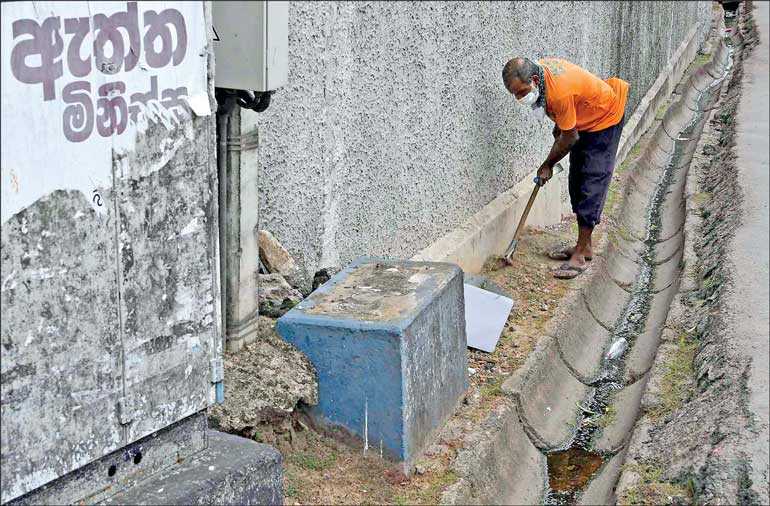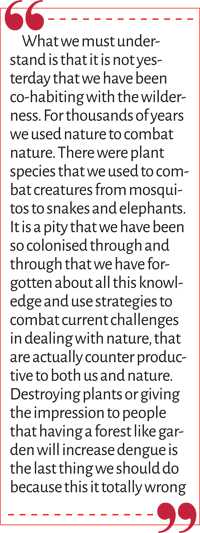Friday Feb 20, 2026
Friday Feb 20, 2026
Saturday, 26 September 2020 00:01 - - {{hitsCtrl.values.hits}}

Public places where water collects are drains, because we the unthinking public, are known to carelessly throw rubbish into drains thus blocking water flow. It is understood that the present practice is to spray toxic chemicals into these drains. As the drains are not water-tight, these harmful chemicals leak into ground water and could poison us – Pic by Shehan Gunasekara
By Ranjit Seneviratne
One of the concerns hitting the headlines is the rise of cases of dengue. Various efforts are being done by the authorities and among the measures taken by them is the clearing of plants and insisting people who grow useful food plants like banana, native herbs, etc. to remove them – not to mention flowering plants needed to encourage bees and butterflies already so absent today, even in villages. 
It is ironic that one of the measures taken for dengue prevention is to force people to uproot whatever few plants they grow while living in an ever increasing concrete jungle, while we talk in the same breadth of sustainability and getting people to grow their food and herbs. Several Weda Wathu (herbal gardens) face this problem and native herbs asked to be uprooted, while seemingly attractive invasive species brought from other countries are promoted horticulturally.
It is important that clear sense should prevail in whatever we do, to protect our health, and to protect the health of Mother Earth. Uprooting plants and getting people to make their gardens a desert on the excuse of dengue mosquito breeding prevention, should be stopped, because it makes no sense.
This kind of reaction appears to be a sort of ‘knee-jerk’ reaction because if it were plants that allowed breeding of the dengue-carrying mosquito, then dengue should be rampant in villages with so much vegetation around them. The reason there is less dengue may be because plants are known to exhude oils and bio-chemicals from their surfaces (like humans exhude salty sweat from the skin’s surface) and the Dengue Mosquito does not like to breed in such chemically polluted water. It is known to prefer clean water.
One thing I personally do when faced with the possibility of water collecting in flower pots is to see that a drop of engine oil (or machine oil or even non-organic coconut oil) is put. The same could be done (put the above oil) to the water that may collect in the ‘saucer’ under the flower pots in our homes. A little used engine oil or machine oil put into the water will ensure that any mosquito larvae that breeds will be killed when it grows to the pupa stage.
This is because any mosquito larvae that is seen wriggling about breathes air dissolved in the water and when they grow to become the comma-shaped Pupa stage, they become air breathers, breathing air from theopening at the top of their head. So if there is oil on the surface of the water the air-tube gets blocked and they die. 50 years ago my father used to advise the gem miners in Ratnapura to do this when the holes that they dig for gem mining gets filled with water after rains, because this is what is commonly done in Malaysia.
What we must understand is that it is not yesterday that we have been co-habiting with the wilderness. For thousands of years we used nature to combat nature. There were plant species that we used to combat creatures from mosquitos to snakes and elephants. It is a pity that we have been so colonised through and through that we have forgotten about all this knowledge and use strategies to combat current challenges in dealing with nature, that are actually counter productive to both us and nature. Destroying plants or giving the impression to people that having a forest like garden will increase dengue is the last thing we should do because this it totally wrong.
In fact when the people from the Colombo Municipality visited my ‘Forest Garden’ in the heart of Colombo, they told me I must remove the banana trees, Aloe Vera, etc. I explained to them about the village areas, plastics as the cause, etc. (the facts as set out in the text below) and they thanked me and gave me a ‘Dengue-free Certificate’ which is displayed on my entrance door.
Dengue is ‘not’ in wilderness-dominated places, but in our concrete jungles
Now below are some of the facts that prove that dengue is ‘not’ in wilderness-dominated places, but in our concrete jungles where we have not yet a proper solution for our garbage problem.
To reiterate; dengue is rampant in densely populated cities and near schools – in other words, where there are people and children who throw plastic yogurt and ice cream cups and plastic bags all over the place as well as thambili and coconut ‘shells’.
Therefore is it not wiser for the authorities to insist that ice cream, yoghurt, etc. should be sold in cardboard-type cups that can be easily punctured or crushed. Thambili sellers should chop up the shells into pieces ready for composting and collect them in gunny bags – and be fined if they leave them around.
Another source of clean water favoured by the Anopheles Aegyptus Mosquito (implicated in the spread of dengue) are plastic bags, even in the new bio-degradable plastic bags. Therefore it is in everyone’s interest if the authorities eliminate plastic bags entirely and insist that only paper, cloth, Jute-hessian or woven leaf (Dumbara Mat ‘Pang’ and Palmyrah leaf) bags be used.
Our nationalistic words spoken at various platforms, including political platforms should be put into ‘action’ and all of us have a responsibility to do so. The above will also help our rural people and the recently settled people in the north where Palmyrah is plentiful, to have gainful employment and help reduce poverty. (Poverty Elimination under the United Nations sponsored Millennium Goals Project). Measures such as above are needed to see that these goals are not just grand talk at grand places.
It was reported some months ago in the daily newspapers that Government researchers had found that there are now two mosquito types that carry the virus and that the dengue-causing mosquitoes have also developed a resistance to the chemicals used in fogging and in drains. It is of course well known, insects are able to develop resistance to chemical pesticides.
So, if mosquitoes can develop resistance to chemicals, we too can increase our ‘natural’ resistance to viral diseases. It is actually quite simple, but we need to take initiative to increase our resistance (like taking action to perhaps ditch our car and walk to work or errands).
Another breeding place are gutters and it is understood that some of the authorities concerned want to impose a ‘No Gutters’ policy for new buildings. Again there is a very simple way to stop water collecting in gutters of both old and new buildings. All it needs is for someone to go up to the roof, pour some water into each of the gutter lengths and to note where it collects (usually at the center of the gutter length as plastic gutters sag with time).
The next step is to drill a small hole (1 mm diameter) at each of these lowest points in the gutters. Then wrap a wire (preferably of non-rusting material) or nylon fishing line (thangus) round a small brass screw and thread the wire/nylon line through the hole in the gutter and lead it to the ground by wrapping the other end round another brass screw or even a stone and burying it a few inches into the ground or in a flower pot. Water therefore cannot collect in gutters as it will quickly leak off into the ground without making an unsightly hole or splashing mud on the the adjacent walls, which would happen if there was no wire/nylon to ‘lead’ the water into the ground. If the holes get blocked by dirt and/or slime – all you need to do is to ‘jiggle’ the wire up and down to clear the block.
Other more public places where water collects are drains, because we the unthinking public, are known to carelessly throw rubbish into drains thus blocking water flow. It is understood that the present practice is to spray toxic chemicals into these drains. As the drains are not water-tight, these harmful chemicals leak into ground water and could poison us – the people. The effect is not immediate but these chemicals are known to gradually accumulate especially in the fat cells and over time could cause cancer and other non-communicable diseases (NCDs). It would perhaps be a good idea for the authorities to look at root causes such as plastics, pot-holes, drains, etc. and develop preventive measures and ‘awareness programs’ in schools, etc. to galvanise the public to join in the battle for good health.
Daily health-based practices
Where daily health-based practices are concerned, following are some action we can take. What I have written below is based on my lifestyle practices where at 84 I am totally free of illnesses and can sprint and even climb up trees without being worried if a dengue mosquito is chasing after me because my immunity is far superior to that of a mosquito’s dengue injection.
(1) Daily eat five or six leaves of raw Holy Basil (Tholasi in Tamil, Maduruthala in Sinhala) in mallums or salads as it is an ‘adaptogen’, a bio-chemical that increases resistance to viral diseases (check the facts from www.mercola.com).
(2) Reduce and if possible eliminate foods that lower resistance to disease, such as refined white sugar (basically a chemical like any lab chemical), and therefore uses up vital minerals in order to be digested, lowering resistance, bone loss in older people and causing diabetes, etc. (check the facts from www.mercola.com).
We need this not only for dengue but for all the mysterious pandemics that we are currently plagued with and are likely to be following us in various different strains in the dim future that we have created by destroying Mother Earth.
We can use alternatives like kithul, palmyra or coconut jaggery (now available in sugar-like powder form) or treacle (peni) or even better sugar cane jaggery which has chomium needed by diabetics and palmyra sugar that has Vitamin B6 and B12 – very good for health.
(3) Reduce and if possible eliminate white flour products, because they contain ‘Gluten’ which also lowers resistance and even causes ill health (check out the harmful effects from www.greenmedinfo.com).
(4) We all know that many farmers use chemical fertilisers and pesticides and we know from Facebook and YouTube that local and imported food products too have chemicals. So we need to grow our own food as much as we can in our home gardens (and not think that this will breed dengue mosquitos).
5) Drink plenty of water (eat fresh fruits too) to prevent your body from becoming dehydrated.
(Note: Next week we will focus on a simple innovation based idea developed by Ranjit Seneviratne (an engineer) for schools and universities to investigate, to prevent dengue. The Harmony page along with the Daily FT will be following this up, with the advice of Ranjit Seneviratne and other select engineers/innovators, to work this out as part of a national innovation project.)